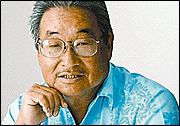Advertisement - Click to support our sponsors.


Sports Watch
THE new marketing relationship between the Hawaii Tourism Authority and the PGA Tour seemed routine enough at first glance, even drawing a "so what?" from golf fans when it was announced Tuesday. GOLF WATCH
Hawaii’s future
with PGA secureBut it has such a significant impact on future professional golf tournaments in Hawaii that Mark Rolfing, who helped to put the baby together, felt the need to point out just how significant the deal is.
When Rolfing speaks, especially when it comes to matters of golf, you listen.
If there has been one individual who has done more to promote golf and make it become an economic impact for the 50th State, it's Rolfing.
"I'm proud of this deal. It's the most exciting, satisfying experience for me," he said.
"The PGA Tour has never done anything like this with any other state. First of all, it protects our place on the PGA Tour. This marketing relationship with the tour will ensure that when the networks bid on the TV rights, the events will be in Hawaii.
"The next television package for the PGA Tour is going to be huge. The numbers are going to be enormous because of Tiger Woods."
The state will commit some $10 million in exchange for commitments that the six men's professional golf tournaments -- the Mercedes Championships, Sony Open, MasterCard Championship, Senior Skins Game, Kaanapali Classic and the PGA Grand Slam -- will remain in Hawaii.
Cynically, some might say it's "protection money."
However, such a practice is not without precedent for the State of Hawaii.
"We did it with the NFL," said Rolfing, referring to the state subsidizing millions to keep the National Football League's Pro Bowl in Hawaii.
And, if you think about it, the Mercedes Championships at Kapalua, Maui, is golf's equivalent of the Pro Bowl, in terms of its high-profile players.
He might be biased, but Rolfing feels that golf provides more economic punch to the state in terms of the economy and tourism.
"The more we do for golf, the more we do for the economy of the state," Rolfing said.
He added that he especially feels it is important to secure the Hawaii-based golf tournaments at least through 2006.
"I've seen sites lose events. I know what can happen," Rolfing said. "That will never happen with this relationship, although the venues for the tournaments might not be the same."
WHAT makes Rolfing especially proud is that Hawaii's golf-tournament boom really started in 1982 with the Kapalua Open, his brainchild.
"In 1981, the only professional golf tournament we had was the Hawaiian Open. That's all we had," Rolfing said.
The next year the Kapalua Open became the Kapalua International, the first of the postseason golf tournaments before the deluge that led to the "silly season."
Then the LPGA discovered Hawaii.
"By 1987 we had 11 televised golf events in Hawaii and none received any financial support from the state," Rolfing said. "By 1992 we were down to six and they lobbied individually for funding. That's what saved those events in the 1990s. Even then it was not enough."
The new deal provides a collective voice and the PGA Tour listened. It's the first time the tour has ever dealt with a destination.
Obviously, Hawaii's pretty face had a lot to do with it.
"I don't think it could have been done at any place except Hawaii," said Rolfing, who will miss a tournament at Kapalua for the first time because he's hosting a Michael Jordan celebrity golf tournament in the Bahamas this weekend for NBC-TV.